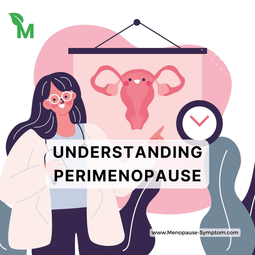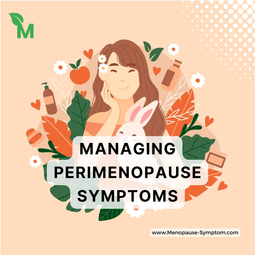Meaning Of Perimenopause: Symptoms, Causes, And Management Tips
On
27/10/2024Reading time:
5 min
Summary:
Discover the meaning of perimenopause, its symptoms, and how it affects your body. Learn about hormonal changes, treatment options, and tips for managing this transitional phase effectively.
What Does Perimenopause Really Mean?
Perimenopause is a natural transition phase in a woman's life that often goes unrecognized or misunderstood. It's the period leading up to menopause, typically beginning in a woman's 40s, but sometimes starting as early as the mid-30s. The meaning of perimenopause is literally "around menopause," signifying the time when your body starts preparing for the end of your reproductive years.
During this phase, your ovaries gradually produce less estrogen, leading to a variety of physical and emotional changes. It's important to note that perimenopause is not a disease or disorder, but a normal part of aging. However, the symptoms can be challenging for many women, affecting their quality of life and daily routines.
Recognizing the Signs: Common Perimenopause Symptoms
Perimenopause affects each woman differently, but there are several common symptoms to be aware of:
Irregular Menstrual Cycles
One of the earliest and most noticeable signs of perimenopause is changes in your menstrual cycle. You might experience:
Longer or shorter periods
Heavier or lighter flow
Skipped periods
These changes can be unpredictable and frustrating, but they're a normal part of the transition.
Hot Flashes and Night Sweats
Many women associate hot flashes with menopause, but they often begin during perimenopause. These sudden feelings of intense heat, often accompanied by sweating and flushing, can be disruptive and uncomfortable.
Mood Swings and Irritability
Hormonal fluctuations during perimenopause can affect your mood. You might find yourself feeling more irritable, anxious, or even depressed. It's crucial to recognize these changes and seek support if needed.
Sleep Disturbances
Difficulty falling asleep or staying asleep is another common complaint during perimenopause. Night sweats can further disrupt your sleep, leaving you feeling tired and irritable during the day.
Changes in Libido
Some women experience a decrease in sex drive during perimenopause, while others may notice an increase. These changes are normal and can be influenced by various factors, including hormonal shifts and emotional well-being.
Understanding the Causes of Perimenopause
The primary cause of perimenopause is the natural aging process. As you approach the end of your reproductive years, your ovaries start producing less estrogen and progesterone. This hormonal shift is responsible for the various symptoms associated with perimenopause.
However, it's important to note that other factors can influence when perimenopause begins and how it affects you:
Genetics: Your family history can play a role in determining when you enter perimenopause.
Lifestyle factors: Smoking, excessive alcohol consumption, and poor diet may contribute to earlier onset of perimenopause.
Medical conditions: Certain autoimmune disorders or cancer treatments can affect ovarian function and trigger perimenopausal symptoms.
Effective Management Strategies for Perimenopause
While you can't prevent perimenopause, there are many ways to manage its symptoms and improve your overall well-being during this transition:
Embrace a Healthy Lifestyle
Making positive lifestyle changes can significantly impact your perimenopausal experience:
Eat a balanced diet rich in fruits, vegetables, whole grains, and lean proteins.
Engage in regular exercise to boost mood, improve sleep, and maintain a healthy weight.
Practice stress-reduction techniques like meditation, yoga, or deep breathing exercises.
Consider Hormone Therapy
For some women, hormone therapy can be an effective way to manage severe perimenopausal symptoms. Discuss this option with your healthcare provider to weigh the potential benefits and risks.
Explore Natural Remedies
Many women find relief from perimenopausal symptoms through natural remedies:
Black cohosh and evening primrose oil may help with hot flashes.
Valerian root can improve sleep quality.
Soy products contain plant-based estrogens that may alleviate some symptoms.
Always consult with your healthcare provider before starting any new supplements or remedies.
Prioritize Self-Care
Taking care of yourself during perimenopause is crucial. This might include:
Getting enough sleep and maintaining a consistent sleep schedule
Practicing good sleep hygiene, such as keeping your bedroom cool and dark
Engaging in activities you enjoy to boost your mood and reduce stress
Stay Informed and Seek Support
Understanding what's happening to your body can help you feel more in control. Don't hesitate to:
Talk to your healthcare provider about your symptoms and concerns
Join support groups or online communities for women going through perimenopause
Educate yourself about the changes you're experiencing
Embracing the Change: A Positive Perspective on Perimenopause
While the meaning of perimenopause often carries negative connotations, it's important to view this transition as a natural and even empowering phase of life. Many women report feeling a sense of freedom and renewed energy as they move through perimenopause and into menopause.
This period can be an opportunity for self-reflection and personal growth. It's a time to reassess your priorities, focus on your health and well-being, and embrace the wisdom that comes with age.
Remember, perimenopause is not the end of something, but the beginning of a new chapter in your life.
Conclusion: Navigating Perimenopause with Confidence
Understanding the meaning of perimenopause, recognizing its symptoms, and knowing how to manage them can help you navigate this transition with confidence and grace. By prioritizing your health, seeking support when needed, and maintaining a positive outlook, you can turn this challenging time into an opportunity for personal growth and empowerment.
Remember, every woman's experience with perimenopause is unique. What works for one person may not work for another, so be patient with yourself as you find the strategies that work best for you. With the right knowledge and support, you can embrace this natural transition and continue to thrive in all aspects of your life.
Source: Team MPS compiled, analyzed and wrote. Please dont reup without source of us. Many thanks.

Understanding Perimenopause
Invalid Date

Managing Perimenopause Symptoms
Invalid Date

Best Foods To Eat During Perimenopause
Invalid Date

